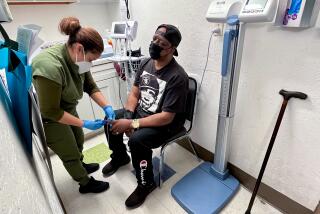Home Monitors Likely Ineffective in Preventing SIDS, Study Says
- Share via
Home monitors designed to prevent sudden infant death syndrome are probably not effective and their use should be curtailed, researchers said last week.
About 20,000 premature infants are sent home with the monitors each year because the babies are thought to be at high risk for SIDS. The monitors are also used on infants with a sibling who died of the syndrome.
The monitors are designed to detect prolonged episodes of sleep apnea, a temporary stoppage of breathing, and slow heart rates. There is no evidence, however, that such events are precursors of SIDS, according to Dr. Rangasamy Ramanathan of the USC School of Medicine and other researchers in a report published in the May 2 Journal of the American Medical Assn.
About 3,000 infants die of SIDS in the United States each year, and the number has been declining as parents increasingly place infants on their backs to sleep.
Ramanathan and his colleagues studied 1,079 infants in five metropolitan areas. They concluded that the events monitored by the devices generally occurred in the first six months of life, while SIDS was more likely to occur later.
In an editorial, Dr. Alan H. Jobe of the Children’s Hospital Medical Center in Cincinnati wrote that “the physiological basis for [using home monitors] is more in doubt than ever,” and he called for a “severe curtailing” of their use.
More Access Advised for Morning-After Pill
Doctors should routinely give prescriptions for “morning after” pills to sexually active women so they can have the drugs on hand in case of need, a physicians’ group recommended last week.
Dr. Thomas F. Purdon, president of the American College of Obstetricians and Gynecologists, said women should have the drugs--which are essentially high-dose birth-control pills--available for use after unprotected sex. Most women do not take advantage of the drugs if they have to go to a physician after the fact. The drugs must be taken within 72 hours after sex to be effective.
Half of all U.S. pregnancies, about 3 million per year, are unintended, and more than a million of them are ended by an abortion. Purdon said many of those pregnancies and abortions could be prevented if there were wider access to the morning-after pills.
Study Finds Heading Soccer Ball Not Risky
A few years back, the nation’s pediatricians were warning about the potential of brain injury for children who “headed” a soccer ball. Now, a researcher at the University of North Carolina at Chapel Hill, has concluded that heading a soccer ball is unlikely to injure children. Citing a review of scientific literature, Dr. Donald Kirkendall of the university’s School of Medicine says that while being accidentally hit in the head by the ball can cause injuries, purposeful heading generally does not do so because the child’s neck muscles are tensed and the child is braced for the impact. In an article in the May issue of Sports Medicine, he said the ball is not usually kicked very hard by children, further lowering the risk.
Oral Warts Are Side Effect of AIDS Drugs
Researchers at UC San Francisco have reported another side effect of AIDS therapy: oral warts. A survey of 1,280 HIV-positive patients over a nine-year period by Dr. Deborah Greenspan and her colleagues found a sixfold increase in oral warts among those given cocktails of drugs for their condition. The team also reported in the May 5 Lancet that patients receiving only one drug for HIV infection had a threefold increase in the warts. “These lesions are troublesome for the patient, can interfere with speaking and eating, and are extremely difficult to treat,” Greenspan said.
Ecstasy Could Cause Infant Abnormalities
A pregnant woman using the drug MDMA, better known as Ecstasy, increases the chances that her child will suffer developmental abnormalities, according to a new study in rodents. A team headed by Dr. Charles V. Vorhees of the Children’s Hospital Research Foundation in Cincinnati administered the drug to newborn rats at periods equivalent to early or late in the third trimester of human pregnancy.
They reported in the May issue of the Journal of Neuroscience (https://www.sfn.org) that the animals given the drug during the period corresponding to the late third trimester suffered from impaired learning and memory. The damage was long-term, persisting even after the rats reached adulthood.
Use of Defibrillators by Police Curbs Deaths
Equipping police officers with portable automatic external defibrillators can double the likelihood that patients will survive a heart attack caused by a heart rhythm disorder. An estimated 350,000 people die of sudden cardiac arrest each year, making it the nation’s leading cause of death. Only about one in every 20 people survives such an attack if not already in a hospital, and in some cities the rate is only one in 50 or one in 100--primarily because of delays in treatment.
In 1999, every police officer in Miami-Dade County in Florida was given an automatic external defibrillator and trained in its use. After they completed training, a police car and paramedics were dispatched every time an emergency 911 call for cardiac arrest was received. Police arrived first 76% of the time.
Dr. Robert J. Myerburg of the University of Miami School of Medicine reported Thursday at a Boston meeting of the North American Society of Pacing and Electrophysiology that, in the first six months of use, 18.3% of people suffering a cardiac arrest survived to be released from the hospital. In the 13-month period prior to the study, when only paramedics had the devices, only 9.6% of victims survived. Significantly, the first responder got to the scene within five minutes nearly half the time, compared with only 10% of the time when paramedics were the only responders available.
Study Finds Sushi Reduces Cancer Risk
Eating sushi may reduce by about half the risk of smokers developing lung cancer, according to Japanese researchers. Widespread consumption of raw fish may be the primary reason why lung cancer rates are about a third lower in Japan than in the United States, even though the Japanese smoke as much as Americans, researchers from the Aichi Cancer Center in Nagoya report in the May issue of the British Journal of Cancer.
The team studied the eating habits of 4,000 healthy people and 1,000 lung cancer victims. They concluded that those who ate large amounts of sushi were only about half as likely to develop lung cancer. Salted or dried fish, however, did not seem to protect against the disease. Scientists are not sure how fish lower the risk, but it may be because they contain polyunsaturated fatty acids.
*
Medical writer Thomas H. Maugh II can be reached at thomas.maugh@latimes.com.






